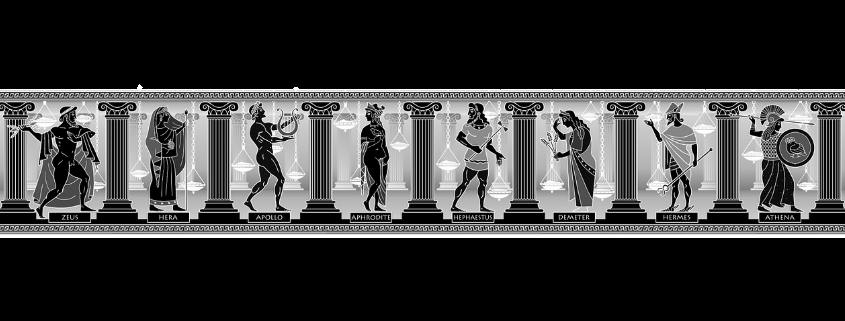What Ancient Greeks and Romans Teach us about Leadership in Volatile Times
As the pandemic recedes, we’re not moving into a new normal but an a-Normal: the opposite of normal. Volatility and uncertainty will dominate, and the most principled and agile will emerge stronger. The ancient Greeks and Romans have essential insights on the kinds of leaders who succeed in these situations.
Why listen to the ancient Greeks and Romans?
Presentism is the belief that only contemporary ideas matter and that you can ignore or sit in judgment over history. It’s a form of hubris and a fast track to dangerous fads and bad decisions.
The reason is simple. People hyper-focused on the present have no basis for judgment. They are guessing and consistently wrong. Why take advice from someone who lacks perspective?
You’ll be better off speaking with someone you respect who has a perspective on what you’re facing in any endeavor. The person may have had personal experience in the matter, helped others, or can draw usefully from the experiences of others.
What are the keys to success in a-Normal times?
The ancient Greek and Roman philosophers and historians lived through a-Normal periods and left written records about what worked and what didn’t. On the subject of leadership, they were very clear. Leaders with arete (excellence) guided their polities, armies, and countries through a-Normality. Demagogues led people to ruin.
An Athenian citizen living in the 5th or 4th century BCE or Roman citizen in the 1st century BCE likely experienced existential wars, clear and present prospects of starvation and economic ruin, pandemics, plagues, new ideas and technologies, and deadly political intrigue. Contemporary thought leaders celebrated officials with arete who guided their communities successfully through such times and wrote comedies and tragedies about those whose love of vulgar fame led to catastrophe.
The concept of arete was simple: demonstrated competence and character in active service to the community. Such leaders possessed the skills needed to do their jobs well and the judgment to make sound decisions in challenging circumstances

They adhered to the four cardinal virtues: wisdom, justice, courage, and self-discipline, using those principles for guidance through ambiguity and accountability to do the right thing, even when it was not popular.
Being competent and following the virtues was not enough. You had to be an exemplar and demonstrate these qualities in service to your community to advance the common good.
If you did not have competence, no one trusted your abilities. Without character, you lacked the moral compass to make tough choices for the common good. Unless you demonstrated arete in the public square, people would think you couldn’t walk the talk.
Too often, public figures proved the importance of these three elements by showing the consequences of their absence. After Pericles died in the plague, corrupt Athenian politicians led the most powerful city of the Mediterranean world into defeat. Alexander the Great conquered a vast empire but lost trust when his soldiers and citizens grew to doubt his character. Julius Caesar was the most celebrated leader in Rome until he set himself up as a dictator. Much of ancient tragedy, comedy, and history are cautionary tales of hubris and vulgar fame.
What does arete mean to us today?
As American society rips itself apart, we see self-dealing politicians and celebrities who pander to various interest groups that egg them on to more narrow-minded actions. People seek social media fame through demeaning antics or moral grandstanding in their own echo chambers. Social and political trust are at historic lows; selfishness and cynicism are high.
Where are today’s Washington’s, Lincolns, and Grants? George Washington showed courage and self-discipline in rejecting demands from his soldiers that he set himself up as a dictator and in leaving the Presidency after two terms. Abraham Lincoln showed wisdom and courage in carefully turning the American Civil War from a war to preserve the Union to a battle to abolish slavery. Ulysses S. Grant had the courage and justice to face down bigots who wanted to turn back the clock on emancipation, thus presiding over one of this country’s most remarkable advances in African-American rights and prosperity.
Like their ancient predecessors, these three Americans were imperfect, but their arete guided this country through volatile and uncertain times. They won the battle with themselves first and then served as exemplars who rallied people to their better natures.

Learning from ancient Greeks and Romans can help you emerge stronger in a-Normal times. Leading with arete will help you make the pivotal decisions that guide your business to new heights and serve as the exemplar who inspires your employee to contribute their best to your organization’s success.
P.S. I invite you to join my online forum Chris Kolenda’s Sustainable Growth Mindset ®. I post unique thought leadership there nearly every day, using historical and world events to boost your imagination about growth and innovation. It’s free for you, and you can sign up here.
P.P.S. I also want to alert you to a new program I’m rolling out soon — a global CEO Mastermind Group that meets monthly via zoom. You get unlimited access to me and interaction with other exceptional people to exchange ideas, help you be your best self, and keep you soaring to new heights. I’m limiting the group to 8 people. Reply to this email for more information.


